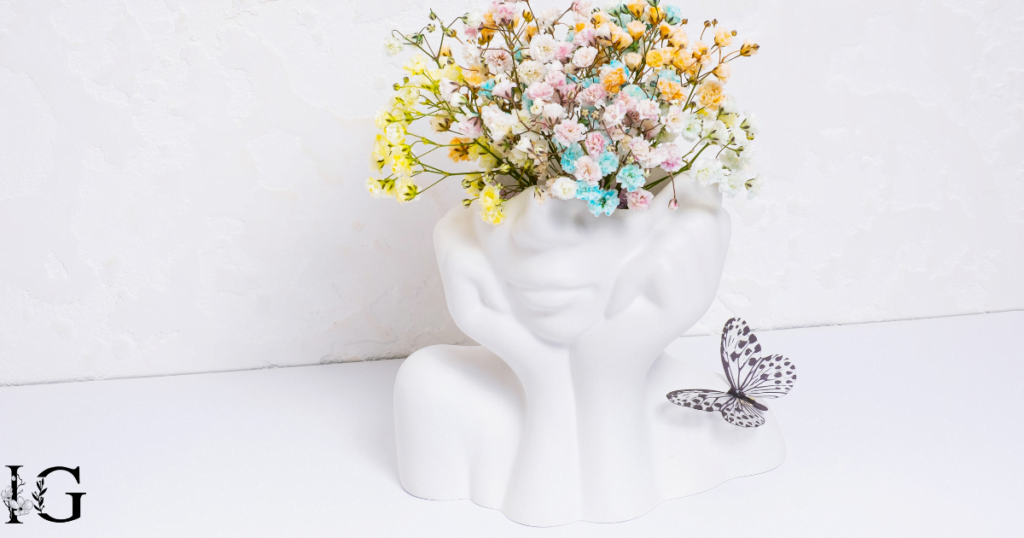This post contains affiliate links. As an Amazon Associate, I earn from qualifying purchases. By clicking on a link and making a purchase, I may earn a commission at no extra cost to you. This helps support my blog and my little family. Thank you SO much for your support! *
With life being so fast-paced, it seems maintaining a healthy state of mind can often feel impossible.
With the demands of family, work, and whatever else you have going on in your life, the amount of “busy” we have going on often leaves little room for self-care.
I’ve learned more and more that prioritizing mental health is so important, and so crucial if we want to achieve long-term happiness.

So with my life at an all-time-high busy period, I wanted to explore some practical strategies for how to integrate mental health well-being into such a busy lifestyle.
We have to understand the importance of mental health
I don’t know how mental health seemed to get such a negative stigma. It only seems like recently that prioritizing mental health is “okay” in society.
It’s nothing to be ashamed of, yet it still seems to carry a sort of embarrassment factor when finding yourself someone who struggles in this area. At least it does for me.
Really, mental health is so important. It affects everything! How we think, feel, and act every single day!
Having good mental health enables stress management, how we relate to others, and our decision making.
Related: Positive Words Of Affirmation | 21 Affirmations To Increase Self-Esteem, Worth & Confidence
If you neglect yourself in this area, you’re probably going to find you feel more burnt out, anxious, or depressed. I know I do!
How to recognize if you’re mental health is strained
Before going into what strategies can help prioritize mental health with such busy lifestyles, it’s important to also be able to recognize the signs that your mental health could use some work:
These signs can be:
- Frequent feelings of sadness or anxiety
- Poor concentration and difficulty making decisions
- Withdrawal from things you normally like to do
- Sleep and appetite changes
- Headaches or stomach aches
If these are showing up more in your life, I’d say it’s time to take action.
Strategies that help prioritize your mental state of mind
- Set Boundaries
One of the most effective ways to protect your mental health is by setting boundaries. This means learning to say no to things that overwhelm you and ensuring you have time for yourself. - Practice Mindfulness
Mindfulness is being present in the moment and can really be a great way to reduce stress. Meditation, deep breathing exercises, or even mindful walking can help center your thoughts and help create a sense of calmness. - Schedule ‘Me Time’
Just as you would schedule any other activity, be sure to schedule time for activities that you enjoy and that relax you. Whether that be reading, gardening, or taking a bath, this time is so important for helping you recharge. - Exercise Regularly
Physical activity is so good for mental health. Exercise releases endorphins, which are natural mood lifters. Even a short daily walk can make a huge difference! - Maintain a Healthy Diet
Just like exercise, nutrition is also so important. Eating a balanced diet rich in fruits, vegetables, lean proteins, and whole grains can improve your mood and energy levels. And a good tip is to avoid excessive caffeine and sugar, which is known to lead to crashes and mood swings. - Get Enough Sleep
Sleep is vital for mental AND physical health. This is the hardest for me, especially with a new baby, but if you can aim for 7-9 hours of quality sleep each night and establish a regular sleep routine by going to bed and waking up at the same time every day, you’re bound to feel better overall. - Stay Connected
Make time to connect with family and friends, even if it’s a quick phone call or text. Supportive relationships provide emotional support. - Seek Professional Help
There is no shame in seeking help from a professional. Therapists, counselors, and psychologists can provide valuable tools and strategies for managing stress and improving mental health. - Practice Gratitude
Gratitude exercises can shift your focus from what’s going wrong to what’s going right. Keep a journal where you write down three things you’re grateful for each day. This simple practice can boost your mood and overall outlook on life. Check out: Boost Your Self-Worth | 18 Tips For Self-Improvement & Positive Growth - Limit Screen Time
Excessive screen time, particularly on social media, can be bad for mental health. Set limits on your screen time and take regular breaks to disconnect.

Creating a Personal Mental Health Plan
When prioritizing mental health, creating a personalized plan can really help.
Here’s a few ideas to get started:
- Take a good look at what you need
- Identify which areas of your life are causing the most stress.
- Ask yourself what activities or practices currently help you relax and feel good.
- Set Realistic Goals
- Set achievable goals for working on your mental health into your daily routine. Start small, such as dedicating even 5 minutes a day to mindfulness.
- Make a Schedule
- Make time to plan out specific times in your day or week for self-care activities.
- Ensure these times are non-negotiable.
- Monitor Your Progress
- Keep track of how these practices affect your mood and stress levels. Journaling can be a great way to do this.
- Adjust your plan as needed to better fit your needs and lifestyle.
- Seek Support
- Share your plan with a friend or family member who can offer encouragement and accountability.
In Conclusion
Prioritizing mental health in a busy lifestyle is not only possible but oh-so-important.
By setting boundaries, practicing mindfulness, scheduling self-care, exercising, eating well, getting enough sleep, staying connected, seeking professional help, practicing gratitude, and limiting screen time, you can create a more fulfilling life.
Just remember, no one is perfect, and taking care of your mental health is an ongoing process, but the benefits are priceless.
What are some ways you prioritize your mental health? Comment below! I’d love to hear what’s worked for you!!!



